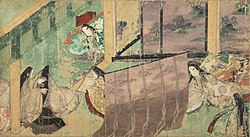Our website is made possible by displaying online advertisements to our visitors.
Please consider supporting us by disabling your ad blocker.
Heian period
Nippon Nippon (日本) | |||||||||||
|---|---|---|---|---|---|---|---|---|---|---|---|
| 794–1185 | |||||||||||
| Capital | Heian-kyō | ||||||||||
| Official languages | Japanese | ||||||||||
| Common languages | Early Middle Japanese | ||||||||||
| Religion | Buddhism Shinto | ||||||||||
| Government | Feudal monarchy | ||||||||||
| Emperor | |||||||||||
• 781–806 | Kanmu | ||||||||||
• 1180-1185 | Antoku | ||||||||||
| History | |||||||||||
• Capital moved to Heian-kyō | 794 | ||||||||||
• Fujiwara clan rule starts | 858 | ||||||||||
• The Tale of Genji is written | 1000-1008 | ||||||||||
• Fujiwara clan overthrown | 1068 | ||||||||||
• Taira no Kiyomori seizes power | 1156 | ||||||||||
• Minamoto clan wins Genpei War | 1185 | ||||||||||
| |||||||||||
}}
| Part of a series on the |
| History of Japan |
|---|
 |
The Heian period (平安時代, Heian jidai) is the last division of classical Japanese history, running from 794 to 1185.[1] It followed the Nara period, beginning when the 50th emperor, Emperor Kammu, moved the capital of Japan to Heian-kyō (modern Kyoto). Heian (平安) means 'peace' in Japanese. It is a period in Japanese history when the Chinese influences were in decline and the national culture matured. The Heian period is also considered the peak of the Japanese imperial court, noted for its art, especially poetry and literature. Two syllabaries unique to Japan, katakana and hiragana, emerged during this time. This gave rise to Japan's famous vernacular literature, with many of its texts written by court women who were not as educated in Chinese as their male counterparts.

Although the Imperial House of Japan had power on the surface, the real power was in the hands of the Fujiwara clan, a powerful aristocratic family who had intermarried with the imperial family. Many emperors had mothers from the Fujiwara family.[2] The economy mostly existed through barter and trade, while the shōen system enabled the accumulation of wealth by an aristocratic elite. Even though the Heian period was one of national peace, the government failed to effectively police the territory, leading to frequent robberies of travellers.
Previous Page Next Page


